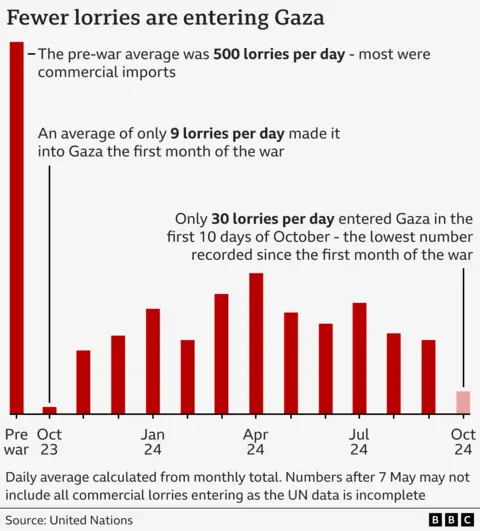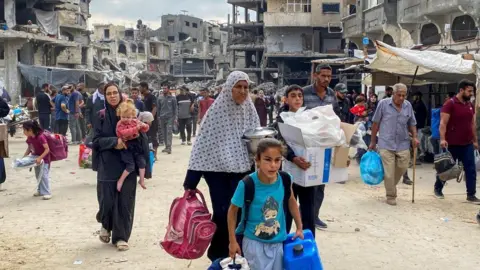
 Getty Images
Getty Images
Since Israel began a renewed military offensive in northern Gaza 12 days ago, humanitarian groups say that virtually no aid has entered the area. Israel's own statistics show that aid deliveries to Gaza as a whole have collapsed when compared with the same period in September.
This has prompted accusations that the Israeli military is blocking food aid deliveries in a bid to starve out Hamas fighters.
The lack of food has prompted a top UN official to warn that "supplies for survival are running out" in north Gaza, with civilians on the ground telling the BBC that the situation is unsustainable.
Joyce Msuya, the UN's Acting Under-Secretary-General for Humanitarian Affairs and Emergency Relief, said on Monday that Israel blocked all food aid entering northern Gaza from 2-15 October.
She said a "trickle" of aid had been allowed to enter the territory on Monday, but warned that a lack of fuel deliveries would force bakeries to close within days.
Israeli Prime Minister Benjamin Netanyahu has repeatedly denied that his government is deliberately preventing food from reaching northern Gaza.
But the US has warned its ally to urgently boost humanitarian access or risk having some military assistance cut off, and now says it is monitoring Israel's actions in northern Gaza to ensure it's not pursuing "a policy of starvation".
On Thursday, a UN-backed assessment warned that “the risk of famine persists across the whole Gaza Strip”, adding: “Given the recent surge in hostilities, there are growing concerns that this worst-case scenario may materialize.”
How much aid is entering Gaza?
The Israeli military body responsible for managing crossings into Gaza, Cogat, said a total of 5,840 tons of food crossed into Gaza in the first 12 days of October, compared to a total of 75,898 tons in September.
The UN said no aid at all had entered Gaza for the two weeks before last Sunday, when the US warned its ally in a letter to urgently boost humanitarian access or risk having some military assistance cut off.
In its own statistics, the UN said the number of lorries entering Gaza was the lowest since the beginning of the war a year ago.


Briefing the UN security council on Wednesday, Ms Msuya said Israel had facilitated just one of 54 attempts to deliver aid through the Rashid checkpoint in the first two weeks of October.
She added that another four efforts were impeded, but eventually occurred. Ms Msuya said that while distribution of existing stocks in northern Gaza continued, supplies were "quickly dwindling".
Meanwhile the World Food Programme (WFP) told the Financial Times on Tuesday that it will run out of food aid to distribute in just a week-and-a-half if Israel does not immediately facilitate fresh deliveries to northern Gaza.
WFP's director for the Palestinian Territories, Antoine Renard, also told the outlet that his teams on the ground had just a week of flour supplies left.
Cogat said 50 trucks carrying aid entered the north of the strip on Wednesday.
Georgios Petropoulos - head of the UN's Office for the Coordination of Humanitarian Affairs in Gaza - told the BBC that when aid does enter Gaza through Israeli checkpoints, aid groups often lack the capacity to distribute it effectively on the other side. He pointed out that while 50 truckloads of aid were allowed to enter Gaza on Monday, the Israel Defense Forces (IDF) allowed just 30 of those to be collected.
What the Israeli military is doing in northern Gaza
The IDF launched a renewed offensive against Hamas in the north 12 days ago. It says it is seeking to prevent the group's fighters from regrouping in the area.
Military officials issued an evacuation order affecting an estimated 400,000 people in the northern Gaza Strip, telling them to move to the south. But many refused to leave, exhausted by constant displacement and fearful of heading to a place where they had no access to supplies.
Israeli forces have surrounded and bombarded the Jabalia area, a refugee camp that has become a densely-populated urban area to the north of Gaza City.
Israel insists that there is no policy of starvation in northern Gaza, but some have speculated that the fall in humanitarian supplies indicates the implementation of what Israeli media has dubbed "the Generals' plan".
Retired Maj Gen Giora Eiland recently told the BBC that civilians should be evacuated from northern Gaza, with the remaining Hamas fighters left with a choice to "surrender or starve".
Prime Minister Benjamin Netanyahu insisted in an interview with Le Figaro that the "allegation that we are pursuing a deliberate policy of starving the population is completely baseless".
He had previously told the UN that Israel was facilitating the entry of food amounting to "more than 3,000 calories a day for every man, woman, and child in Gaza".
What Palestinians in northern Gaza are saying
People in northern Gaza have told the BBC that supplies of food and water have plummeted in recent days.
Awad Hassan Ashour from Jabalia said residents of his area were getting very little food and water was also scarce
"Every two or three days they bring us one meal, either lunch or breakfast,” he said.
Yousef Qarmout, a displaced person in Jabalia, told the BBC that food and water shortages were making "untenable" for those living in the area.
What little food remained on sale was prohibitively expensive, he said.
"Life is becoming ever more untenable in northern Gaza, there is no food at all," he said.
"We also suffer from high prices - take for example a can of beans. It costs 20 shekels [£4; $5.30], which is too much for me because I don’t work, nor do my children work. We all do not have any source of income."
Sayab al-Zad said it was almost impossible to obtain meat or fresh vegetables, noting that only a few people could afford such produce. Instead, his family largely subsisted on bread, he said.
"To get bread for us is a very big challenge, you can lose your life for getting bread," he said.

 Reuters
Reuters
Some Palestinians have fled northern Gaza, many others have stayed where they are
Mr Petropoulos said organised criminal gangs operating in Gaza were exacerbating the problem, with many aid drivers reporting being robbed while transporting food and shelter items.
"I see that the shelters of families are being winterised with plastic sheeting. You can see them starting to be put on top of these boxes of plastic that people live in," he told the BBC.
"The problem is that we were supposed to give that to the people who need it for free. But they’ve been looted and sold to them and now instead of getting a plastic sheet free so that at least you have a waterproof roof for the rain you’re in further debt.
"The damage we’re seeing done through looted equipment and supplies being sold back to people already in desperate poverty is just immense."
Israel has long accused Hamas accused of hijacking and stealing aid deliveries - something the group has denied.
What has the international reaction been?
Michael Fakhri, the UN's Special Rapporteur on the right to food, accused Israel of pursuing a deliberate policy of starvation in Gaza during an interview with the BBC's Newshour programme on Monday.
"We've seen the effects of their starvation campaign, with high mortality rates - people are dying, not just from hunger, but from dehydration and disease, which often follows," he said.
"Israel has told us what it's doing, it's done it, and we've seen the effects."
Thursday's report by the UN-backed Integrated Food Security Phase Classification (IPC) said about 1.84 million people were experiencing high levels of acute food insecurity, with 664,000 of them facing “emergency” levels of hunger and almost 133,000 facing “catastrophic” levels.
The last figure is three-quarters lower than at the time of the last report in June - a fall the IPC attributed to a temporary surge in humanitarian assistance and commercial supplies between May and August.
However, the IPC said it expected the number of people facing “catastrophic” hunger to nearly triple in the coming months because there had been a sharp decline in aid deliveries and food availability since September.
In response to the report, UN Secretary General António Guterres said on X: “Famine looms. This is intolerable. Crossing points must open immediately, bureaucratic impediments must be removed, and law and order restored so UN agencies can deliver lifesaving humanitarian assistance.”
Concerns over the situation have been growing in Washington, and prompted the warning from top officials giving Israel 30 days to boost humanitarian aid access in Gaza or risk having some US military assistance cut off.
The US letter to the Israeli government was signed by Secretary of State Antony Blinken and Defence Secretary Lloyd Austin.
The pair said they were writing to "underscore the US government’s deep concern over the deteriorating humanitarian situation in Gaza, and seek urgent and sustained actions by your government this month to reverse this trajectory".
But the EU's foreign policy chief, Josep Borrell, scorned the US warning.
"The US has been saying to Israel that they have to improve humanitarian support to Gaza, but they gave one month delay," he told reporters in Brussels.
"One month delay at the current pace of people being killed. It's too many people."

 2 months ago
17
2 months ago
17









